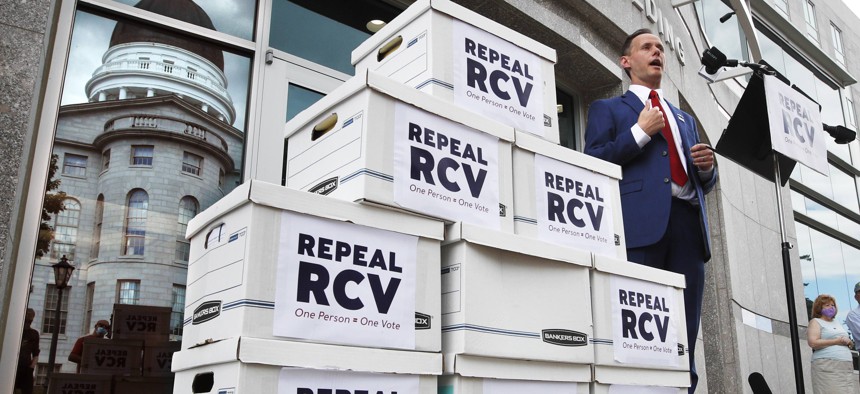Court Ruling Clears Way for Ranked-Choice Voting in Presidential Contest in Maine

Jason Savage, executive director of the Maine GOP, speaks about efforts to repeal ranked-choice voting while standing next to boxes containing signed petitions near the State House, Monday, June 15, 2020, in Augusta, Maine. AP Photo/Robert F. Bukaty
The state would become the first to allow for the voting method in a presidential election.
Maine is now on track to become the first state in the U.S. to allow for ranked-choice voting in a presidential election after a ruling from the state’s Supreme Court on Tuesday.
Republicans in Maine have opposed expanding the voting method, which residents ushered into practice statewide with the approval of a 2016 ballot measure. Since that measure passed, ranked-choice voting was used for primary races and congressional elections in 2018.
But the voting system has also faced a number of legal challenges since it was adopted in the state. Most recently, the Maine Republican Party began a push earlier this year to get a “people’s veto” before voters to repeal legislation that lawmakers passed last year to extend ranked-choice voting to the state’s presidential elections.
Tuesday’s court ruling was the latest chapter in a legal dispute over whether proponents of the veto measure had gathered enough valid signatures to qualify it for the ballot, which would have sunk the possibility of ranked-choice voting in this year’s presidential contest.
The court case was somewhat complicated. But, in a nutshell, the high court on Tuesday upheld a determination by Maine’s secretary of state that supporters of the veto measure were about 1,000 signatures short of the number needed to get the referendum on the ballot.
“Maine voters can now be assured that the race for U.S. president on the November ballot will be conducted using ranked-choice voting,” Maine Secretary of State Matthew Dunlap said.
“The people’s veto question regarding the use of that voting method for president will NOT appear on this ballot,” Dunlap added in a statement following the court ruling.
The Maine Republican Party did not immediately respond to an email inquiry seeking comment about the ruling and attempts to reach them by phone were unsuccessful.
But the group has argued previously that “one person, one vote is a bedrock American principle” that ranked-choice voting undermines.
When ranked voting is used in elections where candidates are vying for a single office, voters select their first choice candidate and can then rank others in order of preference.
If a candidate captures over half the vote, they win. But if nobody claims a majority, then the candidate who receives the least votes is disqualified. Voters who selected that person as their top choice will then have the vote for their second-choice candidate counted.
This process continues until a candidate wins over half the vote.
Proponents say this way of voting has a number of benefits—like ensuring that candidates with the broadest support win elections and that those opposed by a majority of voters cannot prevail, as well as giving people the freedom to back their favored candidates without worrying they’ll split the vote in a way that helps elect a politician they do not support. Some argue it can also help centrist candidates, rather than those appealing to extreme ends of the ideological spectrum.
Ranked-choice voting has become increasingly common in U.S. localities over the past 15 years. Since 2004, there have been 381 ranked-choice voting elections in 18 jurisdictions, according to FairVote, an election reform group that is supportive of the practice.
Santa Fe, New Mexico, San Francisco and Minneapolis are among the places that have permitted ranked-choice voting in certain elections. New York City voters last year approved a ranked-choice voting program set to take effect in 2021.
In Massachusetts, voters will decide on a ballot measure this November that would allow for the voting method in elections for state executive officials and legislators, federal congressional and senate seats, and certain county offices beginning in 2022.
Under a previous court ruling, Maine was able to move forward printing ranked-choice ballots for this year’s presidential election, which is now about six weeks away.
In addition to President Trump and Democratic contender Joe Biden, voters will be able to cast votes for three long-shot third party candidates: Howard Hawkins of the Green Party, Jo Jorgensen of the Libertarian Party and Rocky de la Fuente of the Alliance Party.
The ranked-choice system was a key factor in deciding a 2018 race for Maine’s 2nd congressional district, where Democratic candidate Jared Golden defeated incumbent Republican Bruce Poliquin. Poliquin filed a lawsuit calling into question the constitutionality of the ranked-choice election process, but he later dropped the suit and conceded.
Bill Lucia is a senior reporter for Route Fifty and is based in Olympia, Washington.

NEXT STORY: Contact Tracing in Two North Carolina Counties Shows Difficulty of Reaching Patients






